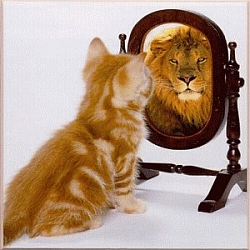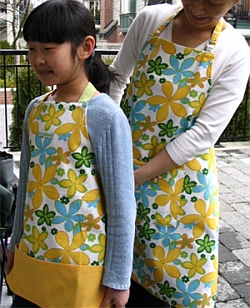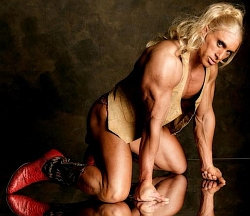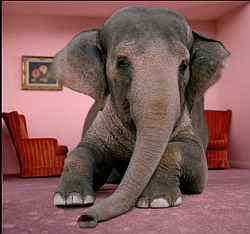When I suggest to female friends or clients that they might be gifted they squirm, they get angry, they laugh it away. “Gifted? Moi? I don’t think so!”

"Each day I see my giftedness more clearly reflected before me."
In itself this is not too much of a surprise. Many clients react to the realization of their giftedness in the same way I did: initial relief, often accompanied by tears, is followed by a dismissive shake of the head and a state of defiant skepticism.
However, for most clients, initial rejection dissolves in the face of reality as their life events and responses consistently mirror the criteria for giftedness so aptly identified by other writers.
For others, however, acceptance seems impossible. “Don’t call me gifted!” they cry, as if threatened by the label.
And it seems to be the women who resist harder than the men.
Real women aren’t gifted
I find it hard to write: “I am a gifted man.” It feels like an invitation to be scorned and dismissed. “Real men aren’t gifted,” says the distorted logic inside me, “so if I’m gifted I’m not a real man”.
In the same way, it seems, gifted women are not real women.
How come? Presumably it’s because “gifted” is a label that, unlike “helpful” or “neighborly”, is perceived in a negative way.
So who might object to a gifted woman? Here is a list of possible culprits:

"Don't cry darling. You can forget those nasty books and be just like mommy now."
- Mother. Not only is her daughter a younger and prettier version of herself, but if she’s gifted she’s special in other ways too. Any mother-daughter competitiveness will swing into action around this one.
- Father. The man who says: “I want her to have the best education available.” is the same one who later says: “I’m your father and I don’t have to listen to your darn fool ideas.”
- Female friends. Women in groups can be brutal in discouraging difference. The need for affiliation has quenched many a woman’s acknowledgment of her giftedness. It doesn’t do to break ranks with the sisterhood.
- Male friends and would-be mates. Heterosexual women still seem to be largely convinced that they need a man to complete them as human beings. The male of the species is not renowned for his embrace of female superiority – other than sometimes in fantasy – so the man-needing woman keeps her enhanced sensibilities and giftedness firmly under wraps.
- Everybody else. Gifted people can be pretty high maintenance. We constantly (and often unconsciously) challenge the prevailing comfortable mood. We are emotionally intense. We are highly sensitive – to physical phenomena as well as human ones.
Given such a comprehensive list of potential offendees, why wouldn’t a girl prefer a J-Lo butt to being gifted?
Maybe the reasons start here:
An imbalance of power
Giftedness is power.
One of the most intriguing statistics in “A Woman’s Nation,” a recently released survey by Maria Shriver and the Center for American Progress, is this: 69% of women think men resent women who have more power than they do. Only 49% of men agree.

Don't recognize yourself? The distorted visions of frightened inner males are not the truth about you.
My personal hunch – based on decades of observing people in the corporate workplace as well as my work as therapist and coach – is that the women are probably right and the men have a hard time admitting it.
To the small boy inside every man, a powerful woman carries the threatening demeanor of a posing body-builder. It’s true that not every man is dominated by his inner small boy. However, a good many are and, in the turmoil of inner male voices, the small boy always makes his contribution.
Forbes magazine recently asked a few from its list of the 100 Most Influential Women in the World for their personal reflections on power. Here are some of their responses [together with some examples of threatened inner-male reactions]:
- “Power is the ability to create change in the world” – Tensie Whelan, Executive Director, Rainforest Alliance [Oh my God! Napoleonic ambition! Worldwide change! And rainforests are only good for turning into superyachts anyway!]
- Power is not being tied to any person or any thing. “If a deal or a relationship does not make sense, I can walk.” – Lynn Tilton, CEO, Patriarch Partners [She can walk?! Leave me? I know – I’ll get her pregnant and economically dependent and then she won’t be going anywhere!]
- “Power is one’s ability to inspire positive change…to impact the global village.” – Tina Sharkey, Chairman [sic] and Global President, BabyCenter [Complete male-terror. New-age globalization combined with baby expertise.]
- Power is confronting “the demons that prevent us as human beings from living up to our full potential.” – Cheryl Dorsey, MD, President, Echoing Green [Demons? The only demon is a woman who can be an MD as well as a President AND be running a social entrepreneurship investment company. (And that’s only the start. Check her out.)]
- Power is having “the ability to change the world in powerful ways through collaborative and collective efforts.” – Linda Avey, Co-Founder and Co-President, 23and ME [There it is again. Changing the world – and in that touchy-feely socialist way rather than just by stamping your boot on it.]
Once my inner little Christopher gets over his fears, what I find most interesting about these women’s words is that they express their interest in power in abstractions and process-oriented statements.
Of course, they are speaking for publication and would probably hide a truth such as: “What I really like about power is rubbing my mother’s/father’s/teacher’s face in their own BS!”. But on the whole I suspect that what they say is true.
Women, after all, are the process-driven gender. Males read the “Tao te Ching” to learn about power. The Tao tells them to adopt the way of the female.
Women have more power than ever before.
In “A Women’s Nation” Mary Ann Mason reports that women receive:
- 52 percent of high school diplomas,
- 62 percent of associate’s degrees,
- 57 percent of bachelor’s degrees and
- 50 percent of doctoral degrees and professional degrees.
- Women are running more than 10 million businesses with combined annual sales of $1.1 trillion.
- Women are responsible for making 80% of consumer buying decisions.
80 percent! So much for the idea of the all-decisive patriarch.
But three problems persist.
- First, I’m committing the sin of confusing giftedness with eminence. I’m doing this quite deliberately up to this point because I believe the world can benefit hugely from women being able to see that they can attain eminence. And that this eminence does not have to come by adopting the male way.
- Second, women have babies.
- Third, women have parents.

Hi there gifted one! Meet your grandmother . . . father . . . mother . . . child . . .
A major elephant in the gifted woman’s living room is that nearly 86% of women agree that women today still bear the primary responsibility for caring for their sick and elderly parents.
In addition, 85% of women believe that where both partners have jobs, it is the woman who takes on more responsibility for the home and family.
I do not believe that this should be so, and not just from the perspective of injustice. The widespread acceptance of this caring ‘responsibility’ too often results in resentful parents and correspondingly resentful children, or resentful carers and tortured elders.
However, it is a massively reinforced social pressure and may not always be denied. So, I suggest that when gifted women have babies they can be gifted mothers. Or if they must be carers, then be gifted carers.
You don’t have to be captains of industry or firebrand politicians. You can pass your unique influence on through your children, your children’s friends and your parents’ social groups.
Embrace your gifted female-ness
The recognition and understanding of the gifted is largely a female-led discipline. This is unusual in the world of psychology and human development that has largely been dominated by males. For every Melanie or Karen there are three Sigmunds, Karls, Carls, Josef’s, BFs and so on.
However, in the specific field of giftedness it is female insight and intellectual rigor that holds sway. Here are just some of the most influential names in the gifted universe:
- Leta Hollingworth
- Annemarie Roeper
- Mary Rocamora
- Linda Kreger Silverman
- Mary-Elaine Jacobsen
This is not to detract from some very significant male contributions but is intended to focus female readers on the possibility of creating a new sisterhood, one in which the chaos and difference of giftedness is embraced rather than shunned.
Don’t be eminent, be gifted
Even though I’m stuck in a male-centric view of giftedness which, taken to its full potential, results in some form of eminence, you can do better. Here’s a definition of giftedness that says nothing about achievement:
- “Giftedness is asynchronous development in which advanced cognitive abilities and heightened intensity combine to create inner experiences and awareness that are qualitatively different from the norm. This asynchrony increases with higher intellectual capacity. The uniqueness of the gifted renders them particularly vulnerable and requires modifications in parenting, teaching and counseling in order for them to develop optimally.” The Columbus Group, 1991
As you can see, being gifted does not force you into some branch of the elite. It merely means you’re different.
I’ll conclude with this extract from a paper by Linda Kreger Silverman, founder of The Columbus Group. It explains why it is so important to claim your label even if you want to do it quietly.

"Shall I embrace my giftedness or just drown it?"
“Gifted children and adults see the world differently because of the complexity of their thought processes and their emotional intensity. People often say to them, “Why do you make everything so complicated?” “Why do you take everything so seriously?” “Why is everything so important to you?”
“The gifted are “too” everything: too sensitive, too intense, too driven, too honest, too idealistic, too moral, too perfectionistic, too much for other people! Even if they try their entire lives to fit in, they still feel like misfits.
“The damage we do to gifted children and adults by ignoring this phenomenon is far greater than the damage we do by labeling it. Without the label for their differences, the gifted come up with their own label: “I must be crazy. No one else is upset by this injustice but me.”
So please. Don’t settle for crazy. Don’t be a woman. Be gifted.
Thank you.
Christopher, as usual, very insightful, meaningful and thought provoking. I have big news for you on Friday specifically relevant to “Power is confronting “the demons that prevent us as human beings from living up to our full potential.” – Cheryl Dorsey, MD, President, Echoing Green”. I’m looking forward to it. Also will pass this on to several of my gifted female friends! ph
Thanks for a very stimulating post. Here are a couple of related quotes:
“There are too many stupid girls in the media. Hermione’s not scared to be clever.” Emma Watson about her character in the “Harry Potter” films.
From my post
http://womenandtalent.com/62/
M. Scott Peck has noted, “Many who are truly superior.. are reluctant to consider themselves ‘better than’ or ‘above’ others, in large part because a sense of humility accompanies their personal and spiritual power.”
In his book “The Road Less Traveled and Beyond” he describes his interview with a young woman: “‘I don’t want to be a whiner’ [she said]. ‘Then you’ll need to learn how to accept your superiority’ I retorted. ‘My what? What do you mean?’
“Jane was dumbfounded. ‘I’m not superior.’ ‘All your complaints [I said] – your whining, if you will – center around your probably accurate assessment that your dates aren’t as smart as you, your professors aren’t as humble as you, and your fellow students aren’t as interesting as you.’”
From my post Celebrating giftedness: You may be gifted – get over it
http://highability.org/67/
I am happy that you are asking gifted women to claim their label, after all “The hand the rocks the cradle rules the world.” We can be Moms and gifted and model for our children what excellence, fulfillment, and acceptance looks like. It may be that we are happy being Moms and that our greatest work (above all the eminent things we’ve done) is to raise our children to love and accept themselves and their gifts. They will go out into the world as whole and healthy people who might also be a force for change. The choice to be a full time Mom was not second-best or what I had to do because I had a baby, it was my first choice and done with great joy. I had my children at 41, had done many things before that, and will have time to do many more after they are raised. After all, I will only be in my 60’s when they are gone to college. I can be a wise crone, a force for change, still a Mom, role model, and gifted woman.
You’re right! Absolutely right! Too much for people – and here I thought it was me! It is very difficult to accept that I’m gifted because I’ve been told all my life that I was too sensitive, too intense, too driven, too idealistic, too moral, too honest – and, truly, too much period. And yet I couldn’t be any other way – when I went to the daVinci exhibit, I felt right at home – diversity, intensity, scope – it was amazing! When I read your article, I felt the same way – finally, I found a “home” of sorts – someone who understands the way I am and it’s not a bad thing – thank you for this article!
When people learn that you’re gifted they expect you to be like a machine in your replies and answers. I find lower class women to be kind of like monkeys and squirrels. They begin chimping around and I end up angry.
Gosh, Wally, where’s Margaret Mead when you need her.
Is it okay to be gifted and mean? Or do I have to be nice all of my life and take all of this abuse?
I drink occasionally to deal with this.
Late to reply to a late comment, but Gina: What does class have to do with (non)giftedness? If you’re gifted, why are you asking whether meanness is “okay” — surely you’ve noticed that it’s up to you to decide and live your values, in an often hypocritically-valued, unreflective world? You come across as a foggy-thinker feeling sorry for herself here, not as an “abused” gifted person. As far as my values go, heaping insults on a class of women is not “okay”, it is itself abusive. There are alternatives to such “meanness” beyond “niceness” and martyrdom: start by simply living up to the capacities of your intelligence. Be true to yourself, but not cruel to others.
And Christopher, for a large part, “80% of consumer buying decisions” means women buy more crap, as astonishing proportion of which is products to construct their feminine identities. Purchasing power does not equal social power, per se.
I’ve arrived at this particular post looking to feel better about the introduction to the overall site, a snippet of which suggests that young women are innately woo-able by shiny things. Right.
Christopher, I’m happy to see your encouraging-side on the subject of gifted women. I would only urge you to lessen your focus on women’s economic positioning slightly, to (re)read more gifted women’s philosophy (Virginia Wolf, Simone de Beauvoir, Emma Goldman, and much etc.) in order to (re)understand the ornate identity-constructions that gifted women have been architecting themselves for eons now.
My favourite gifted woman character in literature is Ivich, in “The Age of Reason” by Jean Paul Sartre. She is very gifted and struggling with it (like Gina, driven to drink by her alienation, and miserable in the face of the arbitrary social customs of being a woman). Poor Jean did a bad job trying to write a light read, but in general, the three central women characters in this novel seem rounder and realer than most in literature to this day (I dare say this was in part the influence of his partner, Simone de Beauvoir).
What would we do without books?
This was sort of weird for me. In truth, I wasn’t nearly as negative about being a girl and woman who is gifted than the way the article reads. What has bothered me, is that I have actually ‘caught flack’ about it as a grown woman – most painfully from an also gifted but not labeled German males spouse/post spouse. Realizing the way it has shaped my expectations and attitudes. Recent challenges within this region: how to make the most of my abilites? How to address this without making too big a deal of it and without pretending its not ‘real’.
Learning to cope better with my learning process: having often been a perfectionistic child and dealing with the truth that people can be fired for making mistakes in working life – the main thing is the steep difference between something I’m good at at something I’m not particularly adept at learning and freaking out over the difference. The only time I like it if others don’t know I’m gifted is when I make mistakes during the learning process and if they don’t know, – it has to do with reacting to it. That and me and the son – are we Mensa or not, do we want to be. I had thought I was a shoe in but in truth I’m more like a borderline case of not quite or just barely…my son might do better than me or about the same let alone maybe not quite as well – not sure. Weird feelings about it. I’ve had Mensa members for friends and they told me they felt I would fit in.
I got mix feelings about this article. First of all, a sense of discovery, relieve, and I love your honesty.
But at the same time, knowing that I stand on shaky grounds. There will be numerous things to do for recognition, acceptance, a lot of proving my self, being frown upon. Like I hadn’t have enough of it.
I’m tired, to be honest. I wish people will just admit and move on.
For all of this time I stick to my camouflagepretending I’m dumber than I really am. I’m not trying to offend any guys here, I don’t know what’s wandering in your heads but it seems that this ‘dumb’ attitude looks attractive to you.
I got several dates for being a nut head, saying nonsense and intentionally asking repeated question.
It’s sickening! I know, probably its something pure that rose in your hearts seeing a confuse innocent girl but I think its unfair that you wont admire this quality till the particular girl get fat or other that scar their appearance.
I’m sorry, but I’m still in the threshold of being open about my giftedness, and I live in a developing country where people are still traditionalist and judgmental. Guys here has a very large ego. But after analyzing it I think it make sense why guys hated gifted, intelligent women. Merely because, they have double control, they could allure you and boss you around. Or, you cant dominate them and made them bend on their knees.
Again I apologize, I have very bad experiences with boys who assume me as threatening. Not all of them are like that, but I have to talk like with a weird monotone voice tone so they wont feel intimidated. And I hated that.
I learn to be desirable for guys, but the more I learn, the more I feel less of my self. And become a true impostor.
Yeah and about the mom and daughter competitiveness, it is in fact very true. My mom is stupid to compete with her own daughter, do she have any dignity at all? I hate how she emphasize her ‘leadership’ capabilities with such arrogance when she shun me to describe what I can do. She manipulates me to do numerous chores, wearing her ‘i’m old and vulnurable’ persona, using me to be her emotional caretaker, but attacking my integrity at the same time. Nobody seems good in my world, every one has ulterior motives. I never found anybody similar to me. I hate to be this lonely.
I want to quit university and pursuit writing. Even though my mom acted she accepted my giftedness, I sense the…envy. I want to live in a big city, or by my self, in a house near a forest and green fields.
I hate my self, I hate everybody, I’m not to blame about what ever has bestowed on me, so please can people just GO AWAY.
Hi,
I’m new here and I love this article because it’s from a gifted man being honest without being paternalistic or otherwise self-centered. Thanks for writing it.
I did have one response to another commentor, and forgive because I don’t know you, but I thought it was particularly harsh and misplaced and I have a tendency to be something of a watchdog about that and I’m okay with that about myself and no one else has responded so far as I can tell, so I’ll jump in:
@ Mo
the abused ARE foggy thinkers. Abuse (and unused & unrecognized giftedness) cognitive function.
and I do believe those of lower social class are more likely to be abused both at home and by society and community.
Please check your privilege.
and @ miriam, it’s the same for me. everything was fine (as far as authority and “being in my place” was concerned) until i left school, though I always suspected that this was the reason I never had any good luck with boys. It’s only as an adult that people are overtly and aggressively hostile about it, ostensibly because as a grown female (but not one with enough overt power not to be taken for granted as a lower than or not being in a position to retaliate), I should “know better” than to “behave” “that way.” People see “being yourself” as more offensive and as aggressive an attack on them (their view of the world and themselves) than they do with children.
sorry that’s destroys/suppresses cognitive function.
I want to cry now :( lol it is relieving to know, however sometimes you’d like to think life could have been different, if you were the same as everyone else. I yearn for normal relationships with other females and males, however I am always different. I just don’t relate to others and others don’t relate to me. I go through thousands of thought processes a day, that just don’t make any sense, why am i like this?? I am also overtly aware of the injustice i see with people, they way they treat each other and why men treat women with no respect. I am way too sensitive for my own good. I always thought there was something wrong with me and I have been diagnosed ADD, because i dream a lot, constantly. However i’m an introvert, deep thinker but active and disciplined, so ADD kind of contradicts my symptoms.
But on the other side, it’s okay. God made me this way, so i will at the very least try and accept it for what it is. I just need to process this information first :)
dear gifted friends,
thanks for the site where i get my tribe. I was lonely growing with all negativities in our society for a gifted woman n that too, married with special children.
i am too a special child.
will like to be friends with you.
thanks,
pramodini
India
Your take on giftedness is laughable and odd.
Tears? Really? Because what? You’re finally accepted into Mensa after years of self-esteem issues?
I actually find that more women fit the American characteristics of gifted individuals.
Creativity. Social change. Writing. Emotional sensitivity.
I’m pretty crass and simply intelligent. I can solve very difficult puzzles.
IQ tested at 147. I have way less gifted characteristics than public-school gifted individuals (IQ of 124-130, usually.)
You guys do have to realize that emotional sensitivity is accessible to non-gifted individuals. So is creativity. So is advanced morality.
Don’t try to monopolize all good human characteristics.
You American gifted people make no sense.
Most of you can’t believe you’re gifted because you make it seem that gifted people are some sort of demigods.
There were more girls in my GT program in high school.
Just saying.
That hurts, as I imagine it’s intended to. My ‘take’ on giftedness may be different from yours, but that’s all. As for the tears, it’s well documented that when we are seen for who we really are the acceptance implied often triggers powerful emotional responses.
I can’t tell whether you’re a male or female Jess. High IQ does not imply giftedness in the sense I use it on this blog. But it might be worth checking whether your perceived lack of other gifted characteristics is the whole truth or the result of a defensive strategy designed to protect you from possible hurt arising from your own sensitivity etc.
Even if you are gifted, you’re not a demigod, Jess. You’re just a human being whose IQ (if nothing else) puts you a long way out of the norm.
Excellent! Maybe my blog entry had some effect . . .
Hi Christopher,
Thanks again for your helpful, thought-provoking website and this article in particular . I was just reflecting on how when I talk to men who are potential mates, I often feel like I scare them off by being “too much.”
First, there is the fact that I am a 53-year-old woman who has chosen not to marry or have children. I find that many men, and many people in general, have trouble comprehending this. I also have traveled to many countries by myself, solo. Additionally, due to a problematic
family situation , I choose not to have contact with any of my family. So I am very independent and self-sufficient, partly because I have had to be, and partly by nature. I am also an atheist, as I can see no valid, intellectually honest reason to believe in gods. And I am an alcoholic , sober for 22 years.
I get the impression that this intimidates potential mates, or that they just plain do not “get” me. In fact, in college I once asked a male friend what men really thought of me, and he said that one told him “Meredith is a very pretty girl but she is hard to talk to. She is very smart to talk to.” LOL!
It is really helpful to me to read you article to know that I am not the only one, and to have it acknowledged that these difficulties do exist.
I must say, I am still surprised that some people seem to consider giftedness as something to “deal with,” as if it were a negative thing. I feel very fortunate to be gifted. To me, complaining about having extra ability would be like complaining about being too rich or too beautiful. It may come with some difficulties, but I still think of it as good fortune for me.
[…] have: never own up to how bright you actually are, or the patriarchy will find ways to smack you down. Gifted women of color face even more […]